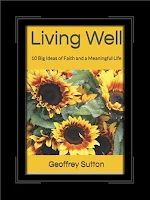Finding Modern Truth in Ancient Wisdom
Why the Meaningful Life is Closer Than You
Think
By
Reviewed by
Geoffrey W. Sutton
The Happiness Hypothesis is one of the best positive psychology books available in 2006
because Haidt integrates lessons from ancient sages with scientific evidence
about a meaningful life.
Haidt begins by explaining two important
systems in the mind as seen by ancient thinkers like the apostle Paul who
considered the common problem of the battle between desires of the flesh and
desires of the spirit. Haidt uses the metaphor of a rider atop an elephant to
illustrate the difficulty in controlling the habitual ways of a large elephant
charging through life with little cognitive awareness.
The second powerful idea is the time-honored
truth that a happy or meaningful life often hangs upon the view people take
toward life events. Our experience with people shows matches the evidence that
people express different attitudes toward the same event such as a pessimistic
or optimistic view.
The third idea is the importance principle
of reciprocity in social relationships. It is a sort of social glue but we must
beware of the ways people can manipulate us toward unhealthy choices.
Our inability to detect our own faults is
the fourth point. It’s amazing how good we are in seeing other’s faults while
being blind to our own, which can lead to impaired relationships.
Haidt parts with some ancient wisdom to
explain how happiness is not just about an inner state of mind, but a
relationship between our inner state and real-world action.
Love is his sixth idea. He examines
different dimensions of love and finds philosophers give bad advice.
People respond to trauma in different ways.
Haidt takes on Nietzsche’s quote, “What doesn’t kill me makes me stronger.” Some
people are resilient and grow as a result of hardship, but some end up with
PTSD. There is a difference.
Chapter eight deals with the corruption of
the rich ideas behind the classic virtues and considers morality in a diverse
society.
His ninth idea deals with spirituality. Haidt
explains the importance of the psychology of disgust to appreciating the human
tendency to rise above life’s unpleasantness and appreciate the awe of the
sacred.
Finally, Haidt considers the interactive
relationship between one person and others in formulating the happiness
hypothesis. There are many ways people may have a happy and meaningful life.
I recommend the Happiness Hypothesis
to anyone who wants to appreciate the way in which psychological scientists
have examined support for ancient wisdom drawn from philosophers and religious
leaders for thousands of years. His book, The Righteous Mind is a follow-up
to the Happiness Hypothesis with a focus on understanding the moral divide
between conservatives and liberals found in many societies.
If you are interested in more in-depth, but highly readable, findings on our divided thinking, read Kahneman’s book, Thinking, Fast and Slow.
Cite this review
Sutton, G. (2021, June 30) The happiness hypothesis-A book review. SuttonReviews. Retrieved from
Book reference
Haidt, J. The Happiness Hypothesis: Finding Modern Truth in Ancient Wisdom: Why the Meaningful Life is Closer Than You Think.
Related Book
Living Well: 10 Big Ideas of faith and a meaningful life.


Comments
Post a Comment